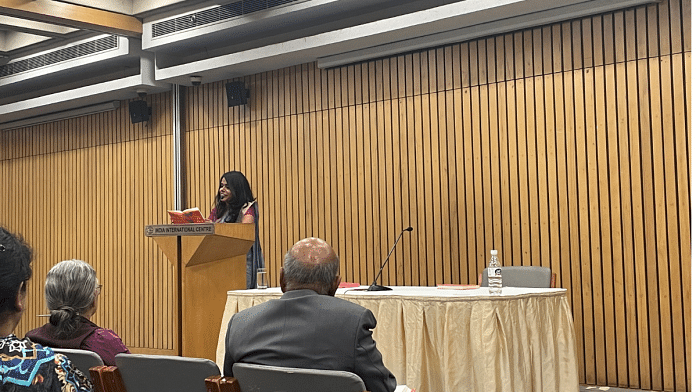New Delhi: In a day and age where brands and marketing strategists commercialise love around 14 February, Indian poet Meena Kandasamy gave it a feminist reverberation at Delhi’s India International Centre. To a packed room of 60 people, the poet read aloud her translations of a part of the ancient Tamil text Tirukkural, which, for aeons, has been heavily censored and misunderstood. Called The Book of Desire, it has been published by Penguin Random House India.
The question on everyone’s minds was: Why do we need an archaic, 2,000-year-old text on love and desire today? “This is the only thing you can actually read to your lover in bed. Is there anything else today worthy of that?” Meena said, highlighting the relevance and progressive outlook of Tirukkural, authored by celebrated Tamil poet and philosopher Thiruvalluvar.
Calling the ancient text the “heartbeat of Tamil civilisation”, Meena laments the various misinterpretations of love and womanhood offered by translators over the centuries. She suggests that interpreters have continuously sanitised the ideas of love and expression of desire in this section of Tirukkural. That’s what she has attempted to cut through in The Book of Desire, which features 250 translations.
Ideas of chastity and ‘pristine’ womanhood have influenced how scholars have interpreted the text. But Meena reveals that Thiruvalluvar wrote Tirukkural with a forward-looking stance and that it actually talks heavily about female desire.
“This book is more than just [the] love between [a] husband and wife. It is not all familial or even heterosexual. It only has words like ‘him’ and ‘her’, which could be men talking to men or women talking to women,” she expresses.
As the second woman scholar to have translated this part of Tirukkural, Meena’s version brings a new angle, dismissing earlier masculinist readings of the text. Niṟai, a word frequently occurring in the text, has been interpreted to mean chastity. But Meena says that the word means ‘fullness’ or the self-contained quality of womanhood.
Also read: Yoga and Kama are not said in same breath in India today. But it…
‘The woman constantly asserts herself’
The IIC room fell quiet as the award-winning poet began reciting from her new book, narrating a woman’s sexual prowess. Smiling throughout, her eyes told the larger story of her passion to bring out Tirukkural’s truth.
She discusses how the dupatta is a cultural signifier in India — women who don’t wear it are often looked down upon as ‘disrespectful’ even today. But Thiruvalluvar was far ahead of his time, and in one poem (Meena’s translation), he says:
“This fine garment
Not touching this woman’s breast
Ornamental, as the blindfold over a male elephant raging in mast.”
Meena talks about the many phases of a relationship from both a man’s and woman’s perspectives. Sex scandals, anger, rumours, gossip, and loss — Tirukkural can be as contemporary as a modern text. More verses explore female sensuality:
“Just his gaze would fill me with such pleasure
Now, the fear of a looming separation taints even sex with sorrow.”
Also read: Indian sex writers are too embarrassed to write well. Unlike good sex, they lack…
The myths of society
One audience member asked Meena whether Thiruvalluvar was referring to his wife, Vasuki. And the translator responded in the negative – Vasuki, a product of her times, was known to be a meek and chaste wife who did not express her sensuality.
“The Tirukural is such a feminist text that it could not have been written about Vasuki. Stories around Vasuki have often made her seem like a meek and chaste wife. Such myths float around in society to ‘regulate’ us, and that is the interpretation people want to hear. But Valluvar was not like that. Moreover, this text does not really deal with marriage,” she emphasised.
Love is a political revolution
Love cannot be discussed without politics. Both are heavily intertwined, and on Valentine’s evening, the IIC audience was interested in more than just another session on erotic poetry. They were eager to dive into the politics of it too.
“It takes enormous courage to be in love,” said Meena. “But it is the entry point into a better world, into the quest for social justice. Love is to look at things with beauty and to reciprocate it, which can be a big political statement [itself].”
Love as a revolutionary act, political dialogue, eroticism, and assertion of a woman’s self-fulfilment — summed up Meena’s thoughts. As the audience rushed toward the author for pictures and signed books, they took away more than one meaning of love home.
“Thank you for today; it feels as if you transported me right to my partner’s bedroom,” said Reeti, a law student and fan of Tamil literature, to Meena.
(Edited by Humra Laeeq)



